Introduction
If you’ve ever dreamed of crafting the next big hit in the gaming world, then learning how to become a video game developer is your first crucial step towards turning that dream into reality. In today’s fast-paced digital landscape, the demand for skilled game developers is higher than ever before. Whether you’re passionate about creating immersive worlds, captivating storylines, or addictive gameplay mechanics, the path to becoming a video game developer is filled with endless possibilities and exciting challenges. In this comprehensive guide, we’ll delve into the essential skills, tools, and resources you need to kickstart your journey in the vibrant realm of game development. So, buckle up and get ready to uncover the secrets of how to become a video game developer, and unleash your creativity in ways you never thought possible.
Understanding the Role of a Video Game Developer
Before diving into the specifics of how to become a video game developer, it’s crucial to grasp the responsibilities and skill set required for the role. Video game developers are the masterminds behind the creation of interactive digital experiences that entertain and engage players. They work in teams to design, program, and test games across various platforms, from consoles and PCs to mobile devices and virtual reality systems. Successful game developers possess a blend of technical expertise, artistic vision, and problem-solving abilities.
Acquiring the Necessary Skills
Becoming a proficient video game developer demands a diverse skill set that encompasses both technical and creative proficiencies. Here are some essential skills to cultivate:
Programming Languages: Mastery of programming languages like C++, C#, or Java is fundamental for game development. These languages are used to write the code that powers the game’s functionality, from physics and artificial intelligence to user interfaces.
Game Engines: Familiarity with game development engines such as Unity or Unreal Engine is indispensable. These powerful tools provide a framework for building, rendering, and deploying games across multiple platforms.
Art and Design: Understanding principles of art and design, including 2D and 3D modeling, animation, and visual effects, is essential for creating captivating game environments and characters.
Game Design: A solid grasp of game design concepts, including mechanics, gameplay dynamics, and user experience principles, is critical for crafting engaging and immersive gaming experiences.
Problem-Solving: Game development is rife with challenges and obstacles. The ability to troubleshoot technical issues, optimize performance, and iterate on designs is key to overcoming these hurdles.
Education and Training Paths
While formal education is not always a prerequisite for breaking into the game development industry, pursuing relevant training can provide aspiring developers with valuable knowledge and credentials. Here are some common educational pathways:
Bachelor’s Degree in Computer Science or Game Development: Many aspiring game developers pursue undergraduate degrees in computer science, software engineering, or game development to gain foundational knowledge in programming, mathematics, and computer graphics.
Online Courses and Tutorials: A plethora of online resources, including tutorials, courses, and workshops, are available for aspiring game developers to learn specific skills and tools at their own pace. Platforms like Udemy, Coursera, and Khan Academy offer courses on game development topics ranging from programming to game design.
Bootcamps and Workshops: Intensive bootcamps and workshops provide hands-on training and mentorship from industry professionals, making them ideal for individuals looking to accelerate their learning and build a portfolio of projects.
Self-Study and Personal Projects: Many successful game developers are self-taught, leveraging online resources and experimentation to hone their skills. Building a portfolio of personal projects, such as indie games or mods, can demonstrate proficiency and passion to potential employers.
Building a Portfolio
In the competitive landscape of game development, a strong portfolio is often the key to securing employment or freelance opportunities. Your portfolio should showcase your skills, creativity, and versatility as a game developer. Here are some tips for building an impressive portfolio:
Diversify Your Projects: Include a variety of projects that demonstrate your proficiency in different aspects of game development, such as programming, art, design, and audio.
Quality Over Quantity: Focus on creating polished, high-quality projects that highlight your attention to detail and craftsmanship.
Showcase Your Process: Provide insight into your creative process, including concept art, design documents, and development milestones, to demonstrate your thought process and problem-solving skills.
Seek Feedback and Iteration: Solicit feedback from peers, mentors, and online communities to continuously improve your work and refine your portfolio.
Stay Updated: Regularly update your portfolio with new projects and achievements to showcase your growth and evolution as a game developer.
Navigating the Job Market
Once you’ve honed your skills and built a compelling portfolio, it’s time to enter the job market and pursue opportunities in the game development industry. Here are some strategies for finding and securing employment:
Networking: Attend industry events, conferences, and meetups to network with fellow game developers, recruiters, and studio representatives. Building professional relationships and connections can open doors to job opportunities and collaborations.
Job Boards and Websites: Explore online job boards and websites dedicated to game development careers, such as GameDev.net, and Indeed. Monitor job listings regularly and tailor your applications to match the specific requirements of each position.
Internships and Freelance Work: Consider applying for internships or freelance projects to gain practical experience and expand your professional network. These opportunities can lead to full-time employment or serve as valuable stepping stones in your career.
Research Companies and Studios: Research game development studios and companies that align with your interests and career goals. Familiarize yourself with their games, culture, and job openings to tailor your applications and demonstrate your passion for their work.
Stay Persistent and Resilient: The game development industry is competitive, and rejection is a common part of the job search process. Stay persistent, resilient, and continue to refine your skills and portfolio while actively pursuing opportunities.

Top Online Education Platforms Where You Can Learn How to Become a Video Game Developer
In today’s digital age, the realm of video game development offers boundless opportunities for creative minds to thrive. Whether you’re an aspiring game designer, programmer, or artist, the path to becoming a proficient video game developer begins with quality education. Fortunately, the internet has revolutionized learning, offering a plethora of online platforms tailored to aspiring game developers. Let’s delve into the top online education courses platforms where you can embark on your journey to mastering the art of video game development.
Udemy
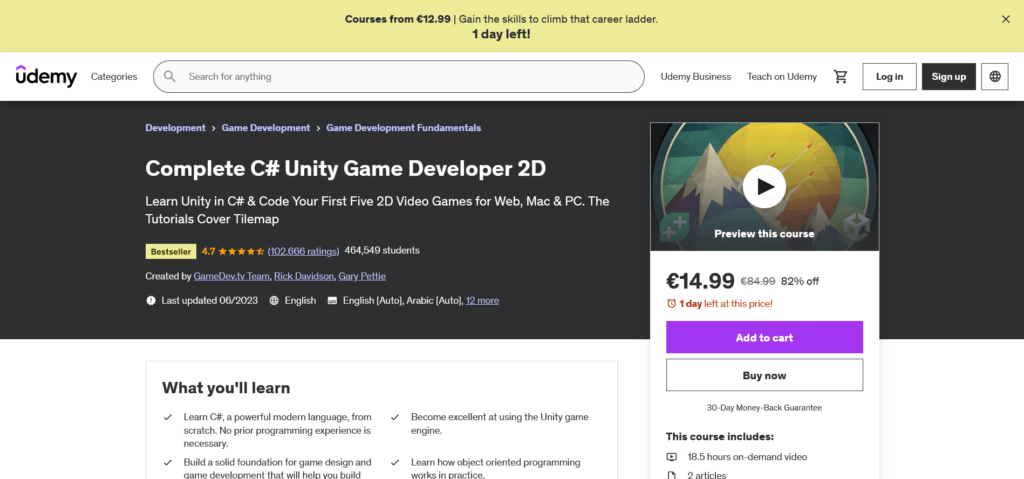
Udemy stands as a beacon of accessible education, offering a myriad of courses catering to diverse interests, including video game development. With a plethora of courses ranging from beginner to advanced levels, Udemy provides comprehensive training on game design, programming languages like Unity and C#, and 3D modeling with tools like Blender. Moreover, Udemy’s affordability and lifetime access to course materials make it an attractive option for budding game developers seeking flexibility and value.
Coursera
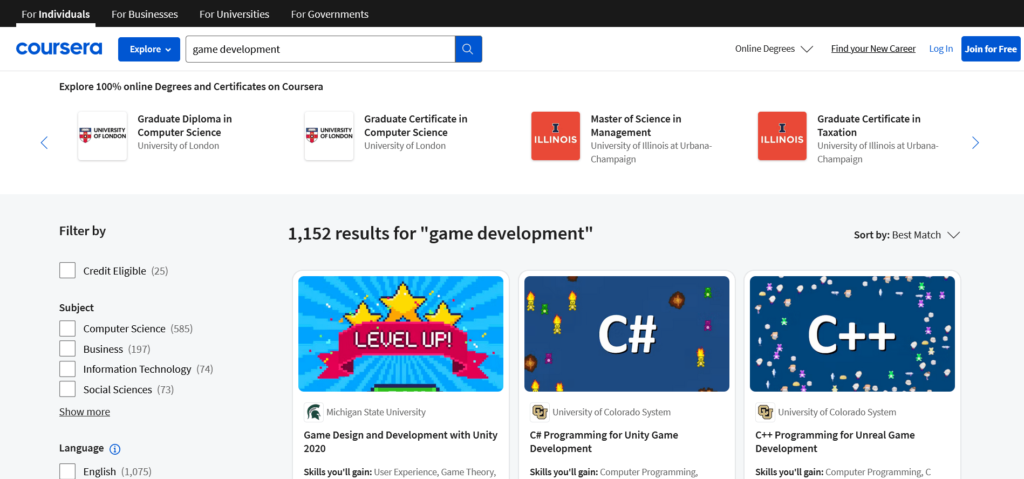
Coursera partners with renowned universities and institutions worldwide to deliver high-quality, structured online courses in various disciplines, including video game development. Through Coursera, learners can enroll in specialized game development programs, gaining insights from industry experts and acquiring practical skills in game design, virtual reality (VR), and augmented reality (AR). Additionally, Coursera’s certification programs enhance learners’ credibility within the competitive gaming industry, opening doors to lucrative career opportunities.
LinkedIn Learning
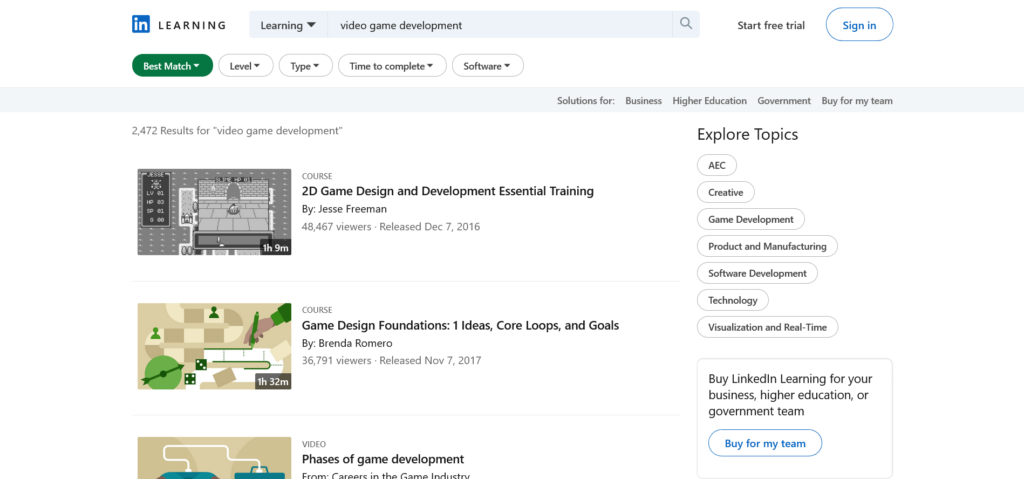
Formerly known as Lynda.com, LinkedIn Learning offers a plethora of video tutorials and courses designed to enhance professional skills, including video game development. With expert-led courses on game design principles, programming languages, and game production pipelines, LinkedIn Learning empowers learners to embark on a rewarding journey towards becoming proficient game developers. Furthermore, LinkedIn Learning’s integration with the LinkedIn platform facilitates networking and career advancement, enriching learners’ opportunities within the gaming industry.
Skillshare
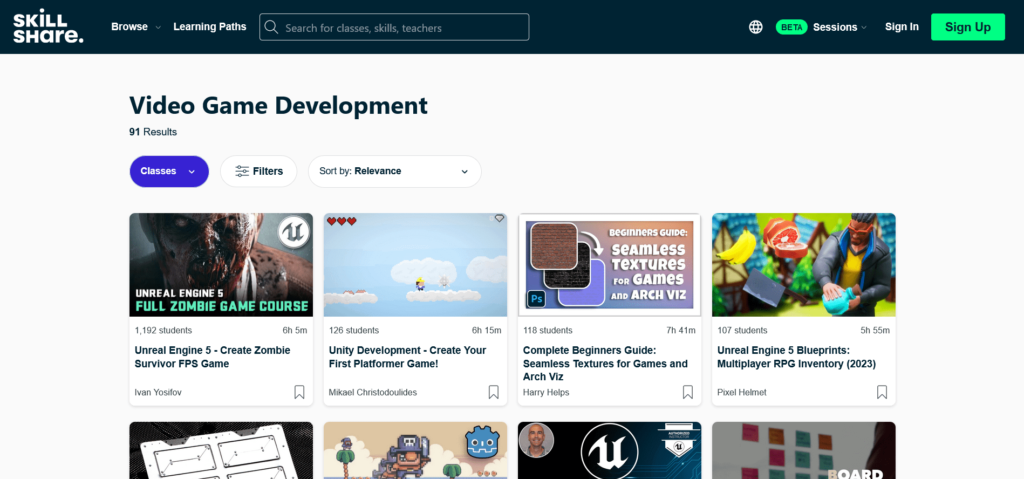
Skillshare is a popular online learning community that offers thousands of classes on a wide range of topics, including game development. With Skillshare, you can access courses taught by industry professionals and experts who provide practical insights and hands-on guidance. Whether you’re interested in learning the basics of game programming, mastering game design principles, or exploring advanced topics such as virtual reality game development, Skillshare has something for every skill level.
Pluralsight
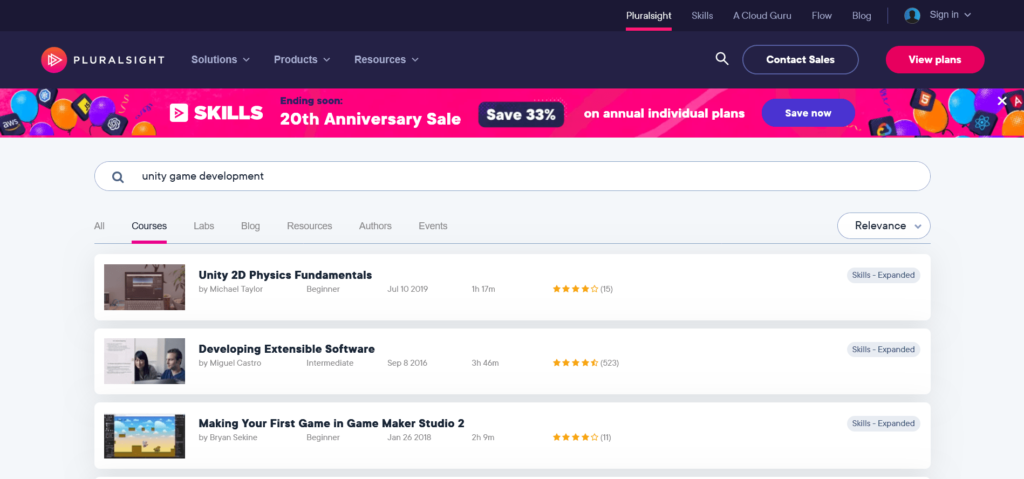
Pluralsight is a popular online learning platform that caters to tech professionals seeking to expand their knowledge and expertise. With a focus on technology and software development, Pluralsight offers a wide range of courses on game development topics such as programming, graphics, and game design. Whether you’re a beginner looking to learn the basics or an experienced developer seeking to stay up-to-date on the latest tools and techniques, Pluralsight provides in-depth instruction and hands-on learning opportunities. With a subscription-based model, Pluralsight offers unlimited access to its entire library of courses, making it a cost-effective option for those serious about advancing their careers in game development.
Top 10 Questions and Answers About How to Become a Video Game Developer
1. What skills are required to become a video game developer?
Mastering game development requires a blend of technical skills, creativity, and problem-solving abilities. Proficiency in programming languages such as C++, Java, or Python is essential. Additionally, a strong understanding of game engines like Unity or Unreal Engine, as well as graphic design and animation skills, can greatly enhance your capabilities.
2. What education do you need to become a video game developer?
While a formal education in computer science, software engineering, or game development can provide a solid foundation, it’s not always a prerequisite. Many successful developers are self-taught or have learned through online courses, tutorials, and practical experience. However, a degree can offer structured learning and networking opportunities that may accelerate your career growth.
3. How do you get started in video game development?
Begin by familiarizing yourself with game development concepts and tools. Experiment with game engines, code snippets, and tutorials to gain hands-on experience. Build a portfolio showcasing your projects, whether they’re small games, mods, or prototypes. Participating in game jams and joining online communities can also help you connect with fellow developers and receive valuable feedback.
4. What are the different roles in game development?
Game development encompasses various roles, including programmers, artists, designers, and producers. Programmers write the code that brings games to life, while artists create visuals such as characters, environments, and animations. Designers focus on gameplay mechanics, level design, and user experience, while producers oversee project management and coordination.
5. Is game development a profitable career?
Game development can be a lucrative career path, especially for talented and experienced professionals. The industry continues to grow, fueled by the popularity of video games across multiple platforms. Successful developers can earn competitive salaries, royalties from game sales, or even create their own independent studios.
6. What are the challenges of becoming a video game developer?
Like any creative industry, game development comes with its own set of challenges. Tight deadlines, technical hurdles, and market competition are common obstacles developers face. Additionally, maintaining work-life balance and staying motivated during the ups and downs of the development process can be demanding.
7. Are there specific programming languages for game development?
While there’s no one-size-fits-all answer, certain programming languages are commonly used in game development. C++ is widely favored for its performance and versatility, particularly in AAA game development. Java and C# are popular choices for indie developers, thanks to their ease of use and robust support in game engines like Unity.
8. What are the best game engines for beginners?
Unity and Unreal Engine are two of the most popular game engines for beginners and experienced developers alike. Unity offers a user-friendly interface and extensive documentation, making it ideal for newcomers. Unreal Engine boasts powerful graphics capabilities and a robust feature set, although it may have a steeper learning curve.
9. How important is networking in the game development industry?
Networking plays a crucial role in advancing your career in game development. Attending industry events, joining online forums and social media groups, and collaborating with other developers can open doors to job opportunities, mentorship, and valuable insights. Building a strong professional network can also lead to partnerships and project collaborations.
10. What advice do experienced game developers have for beginners?
Experienced game developers often emphasize the importance of perseverance, passion, and continuous learning. Start small, focus on honing your skills, and don’t be afraid to make mistakes along the way. Seek feedback from peers and mentors, and always strive to improve your craft. Remember, becoming a successful game developer is a journey filled with challenges and rewards.
In conclusion, embarking on the path to becoming a video game developer is an exciting and rewarding endeavor. By equipping yourself with the right skills, knowledge, and mindset, you can turn your passion for gaming into a fulfilling career. Stay curious, stay persistent, and never stop creating. The world of game development awaits your creativity and innovation!
Top 10 Questions and Answers for Video Game Developer Job Interviews
Entering the world of video game development is an exciting journey, but navigating the job interview process can be intimidating. To help you land your dream role, we’ve compiled a comprehensive guide answering the most common questions asked during interviews for video game developer positions. From technical prowess to creative problem-solving, mastering these questions will showcase your skills and passion for game development.
1. Can you walk us through your experience with game development projects?
This question provides an opportunity to highlight your relevant experience. Discuss your past projects, emphasizing your roles, responsibilities, and contributions. Be sure to mention any challenges you faced and how you overcame them, demonstrating your problem-solving abilities and adaptability.
2. What programming languages and game engines are you proficient in?
Detail your expertise in programming languages commonly used in game development, such as C++, C#, or Java, and mention any additional languages you’re familiar with. Highlight your experience with popular game engines like Unity or Unreal Engine, showcasing your ability to leverage these tools to create immersive gaming experiences.
3. How do you approach debugging and troubleshooting in game development?
Demonstrate your troubleshooting skills by explaining your systematic approach to debugging code and resolving technical issues. Discuss your use of debugging tools and techniques, emphasizing your attention to detail and persistence in identifying and fixing bugs.
4. Can you describe a challenging problem you encountered during a game development project and how you solved it?
Share a specific example of a challenging problem you faced, providing context on the project and the obstacles encountered. Walk the interviewer through your problem-solving process, detailing the steps you took to analyze the issue, brainstorm solutions, and implement a resolution. Emphasize the lessons learned and the positive outcomes achieved through your efforts.
5. How do you stay updated on the latest trends and technologies in game development?
Highlight your commitment to continuous learning and professional development by discussing your strategies for staying informed about advancements in the industry. Mention relevant resources such as online courses, conferences, forums, and industry publications, showcasing your enthusiasm for staying ahead of the curve.
6. What role do you typically assume in a collaborative game development environment?
Illustrate your ability to work effectively within a team by describing your typical role in collaborative game development projects. Emphasize your communication skills, adaptability, and willingness to collaborate with designers, artists, and other developers to achieve project goals.
7. Can you provide examples of your experience with game optimization and performance tuning?
Highlight your expertise in optimizing game performance by discussing specific techniques you’ve employed to improve frame rates, reduce load times, and enhance overall gameplay experience. Share examples of projects where you successfully optimized code, assets, and resources to achieve optimal performance across different platforms.
8. How do you approach integrating audio and visual elements into gameplay mechanics?
Demonstrate your understanding of the importance of audio-visual integration in game design by discussing your approach to incorporating sound effects, music, and visual effects to enhance gameplay mechanics and storytelling. Highlight your ability to collaborate with audio and visual designers to create cohesive and immersive gaming experiences.
9. Can you discuss a time when you had to prioritize tasks and manage tight deadlines in a game development project?
Illustrate your project management skills by sharing a specific example of a project with tight deadlines and competing priorities. Describe how you organized tasks, set priorities, and managed your time effectively to meet project milestones and deliverables, showcasing your ability to thrive in high-pressure environments.
10. Why are you passionate about game development, and why do you want to work in this industry?
Communicate your genuine passion for game development by sharing personal anecdotes, experiences, and inspirations that fuel your enthusiasm for the industry. Discuss the impact of gaming on your life and the opportunity to contribute to creating immersive worlds and memorable experiences for players, conveying your genuine excitement for the work you do.
Two Example Resumes for a Video Game Developer With Different Levels of Experience
Resume Example 1: Entry-Level Video Game Developer
[Full Name]
[Address] [City, State, ZIP] [Phone Number] [Email Address] [LinkedIn Profile (optional)]
Objective: Passionate and skilled entry-level Video Game Developer with a strong foundation in programming and game design. Eager to contribute to innovative game projects while continuously learning and growing in a dynamic team environment.
Education: Bachelor of Science in Computer Science [University Name], [Location] (Expected Graduation: [Month, Year])
Skills:
- Proficient in programming languages such as C++, Java, and Python
- Familiarity with game engines like Unity and Unreal Engine
- Understanding of 2D and 3D graphics rendering
- Knowledge of game design principles and mechanics
- Strong problem-solving and analytical skills
- Excellent teamwork and communication abilities
Projects:
- Developed a 2D platformer game using Unity, implementing player controls, enemy AI, and level design
- Created a simple mobile game using Java and Android Studio, focusing on user interaction and intuitive gameplay mechanics
- Contributed to a group project simulating a multiplayer online battle arena (MOBA) game, collaborating with team members to integrate various game systems
Experience: Intern, Game Development Studio [Company Name], [Location] [Dates]
- Assisted senior developers in debugging and optimizing game code
- Participated in team meetings to discuss project progress and brainstorm solutions
- Conducted research on emerging technologies and industry trends to inform development strategies
Resume Example 2: Experienced Video Game Developer
[Full Name] [Address] [City, State, ZIP] [Phone Number] [Email Address] [LinkedIn Profile]
Objective: Experienced Video Game Developer with a proven track record of delivering high-quality games across multiple platforms. Skilled in all aspects of game development, from initial concept to final release, and adept at leading teams to success in fast-paced environments.
Education: Bachelor of Science in Computer Science [University Name], [Location] [Graduation Year]
Skills:
- Proficient in programming languages including C++, C#, and Python
- Extensive experience with Unity and Unreal Engine, including asset integration, physics simulations, and optimization
- Strong understanding of game design principles and player psychology
- Excellent problem-solving abilities and attention to detail
- Effective leadership and project management skills
- Exceptional communication and collaboration with cross-functional teams
Projects:
- Led a team of developers to create a successful mobile game that achieved over 1 million downloads within the first year of release
- Developed a multiplayer online battle royale game from concept to launch, overseeing all aspects of development including gameplay mechanics, networking, and server infrastructure
- Designed and implemented a procedural generation system for dynamic level creation in a sandbox game, resulting in increased player engagement and replayability
Experience: Senior Game Developer [Company Name], [Location] [Dates]
- Designed and implemented core gameplay systems for multiple AAA titles, including combat mechanics, artificial intelligence, and player progression
- Mentored junior developers, providing guidance on best practices and coding standards
- Collaborated with artists and designers to ensure cohesive integration of gameplay features with visual and narrative elements
- Participated in post-mortem analyses to identify areas for improvement and refine development processes
Conclusion
As we conclude our exploration into the realm of game development, it’s clear that the journey of how to become a video game developer is one filled with both challenges and rewards. Armed with the knowledge, skills, and determination acquired through this guide, you’re now equipped to embark on your own path towards success in the ever-evolving gaming industry. Remember, becoming a video game developer is not just about mastering coding languages or learning design principles; it’s about embracing creativity, problem-solving, and a passion for bringing virtual worlds to life. So, whether you’re diving into your first indie project or joining a AAA studio, always keep the spirit of how to become a video game developer alive in everything you do. With dedication and perseverance, you’ll not only make your mark in the gaming world but also contribute to shaping its future for generations to come. So, go forth, aspiring developers, and let the journey of how to become a video game developer be your guide to a thrilling and fulfilling career in game development.














